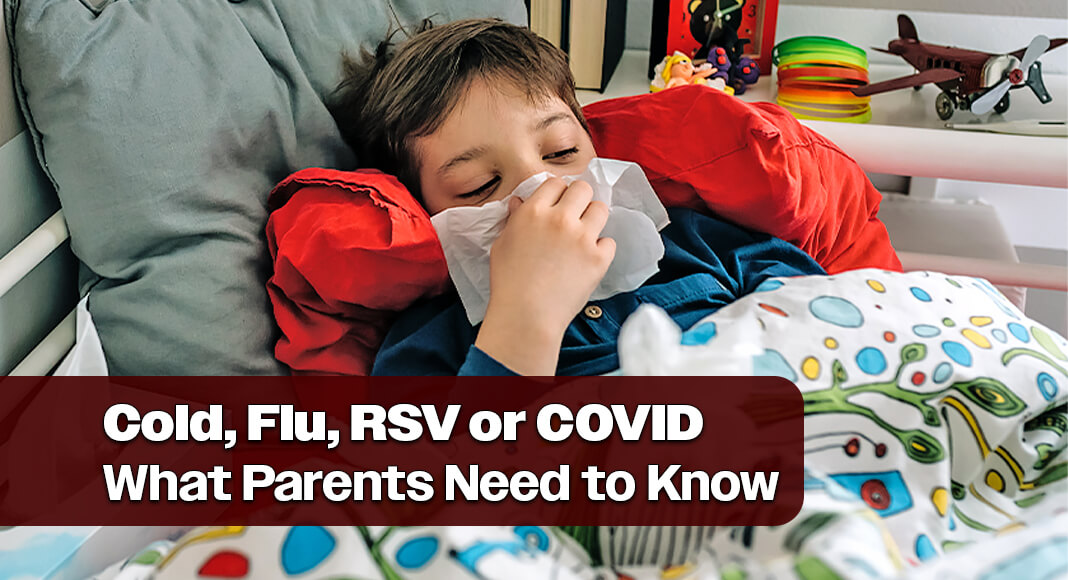
Mega Doctor News
Newswise — NEPTUNE, N.J. – As we head deeper into fall and toward the holiday season, your little one may start to exhibit symptoms like a runny nose, cough, or fever. But with the overlap between the common cold, influenza (the flu), respiratory syncytial virus (RSV), and COVID-19, it can be difficult to know what is behind their illness and how to treat it.
According to the Centers for Disease Control and Prevention, an overall similar peak rate of hospitalizations second to RSV, Flu and COVID-19 combined is predicted compared to last year. For the pediatric population, RSV is predicted to be the leading cause of hospitalizations due to a respiratory illness. This risk is highest in infants under 6 months of age. Melissa Wallach, MD, FAAP, a pediatrician at K. Hovnanian Children’s Hospital at Hackensack Meridian Jersey Shore University Medical Center, shares what parents need to know to navigate this year’s virus season.
How can I tell if my child has a cold, the flu, RSV or COVID-19?
The symptoms overlap significantly, which can be confusing for parents. The only definitive way to know is through diagnostic testing, but there are some general patterns I see in my pediatric patients:
- Common cold: A cold, often called an upper respiratory tract infection, is relatively mild compared to the other illnesses. Symptoms tend to come on gradually and often include a runny or stuffy nose, sneezing, sore throat and a cough. A low-grade fever is possible, but not always present. For the most part, your child will still have the energy to play and will continue to eat and drink fairly well.
- Flu: The flu usually hits hard and fast. A child who was fine in the morning can be miserable by the afternoon. Key signs include a sudden high fever, body aches (your child might complain of their legs hurting or just seem extra fussy and unwilling to be moved), headache, sore throat and significant fatigue or lethargy. They will look and act much sicker than they would with a simple cold. Gastrointestinal symptoms (vomiting and diarrhea) can occur particularly in younger children.
- RSV: This virus can cause inflammation of the lungs and airways and can present with a runny nose, coughing or wheezing, and increased work of breathing. In severe cases, we see pneumonia, decreased oxygen levels and pauses of 10 seconds or more in breathing. Infants may seem irritable and may eat or drink less.
- COVID-19: This one causes a lot of confusion, as it can look like a mild cold, be as severe as the flu, or have unique symptoms. In children, COVID-19 can present with any of the above respiratory symptoms, but we also see gastrointestinal issues like vomiting and diarrhea more frequently than with the other viruses. While the loss of taste or smell is a known symptom in adults, it is less common and harder to identify in young children.
Are some children more at risk for severe illness from these viruses?
Yes, certain pediatric populations are more vulnerable. Infants under 6 months old are at high risk because their immune systems are still developing and they are too young to be vaccinated against the flu or COVID-19. Children of any age with underlying health conditions, such as asthma, diabetes, heart conditions, immunocompromised status, history of premature birth among other conditions, are also more susceptible to complications.
What is one of the biggest misconceptions parents have about these illnesses in children?
A misconception I often educate parents about is that fevers are a sign of trouble. While a fever can be scary and is something to monitor, it is a normal sign that the body is fighting an infection. What is more important than the number on the thermometer is your child’s overall behavior. A child with a fever who is still playful is less concerning than a child with a fever who is listless and refusing to drink. The critical exception is for newborns: any fever in an infant under 3 months of age requires an immediate call to your pediatrician.
How can I protect my child, and when should I call the pediatrician?
Prevention is your best tool.
- Vaccinate: the most effective way to prevent severe illness is to get your child vaccinated against the flu (for ages 6 months and up), RSV (if the mother did not have one during pregnancy for babies under 8 months of age during the RSV season), and COVID-19 (for eligible ages). Speak to your child’s pediatrician to learn more information and determine a vaccine schedule that is appropriate for your child. Real world data from last year showed a 43 to 52% reduction in RSV hospitalizations among infants 0 to 7 months of age due to RSV maternal and infant immunizations.
- Practice good hygiene: teach your children to cover their mouths when they cough and sneeze and to wash their hands frequently with soap and water, especially after coughing, sneezing, or using the bathroom.
- Keep them home: If your child is sick, please keep them home from school or daycare to prevent spreading germs and to allow them to rest and recover.
Trust your parental instincts. You should always call your pediatrician if:
- Your infant under 3 months has a fever
- Your child is breathing fast, flaring their nostrils, or has other trouble breathing
- They are showing signs of dehydration (no wet diapers or urination for 6 to 8 hours, crying without tears, unable to keep fluids down or refusing to drink)
- They are unusually irritable, lethargic or difficult to arouse
- Their fever persists for several days or their condition seems to worsen
Navigating childhood illnesses can be stressful, but your pediatrician is your partner in keeping your child healthy. Never hesitate to reach out with your concerns – especially during cold and flu season.









